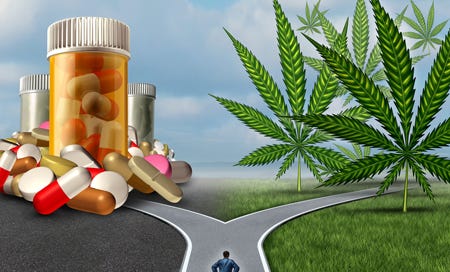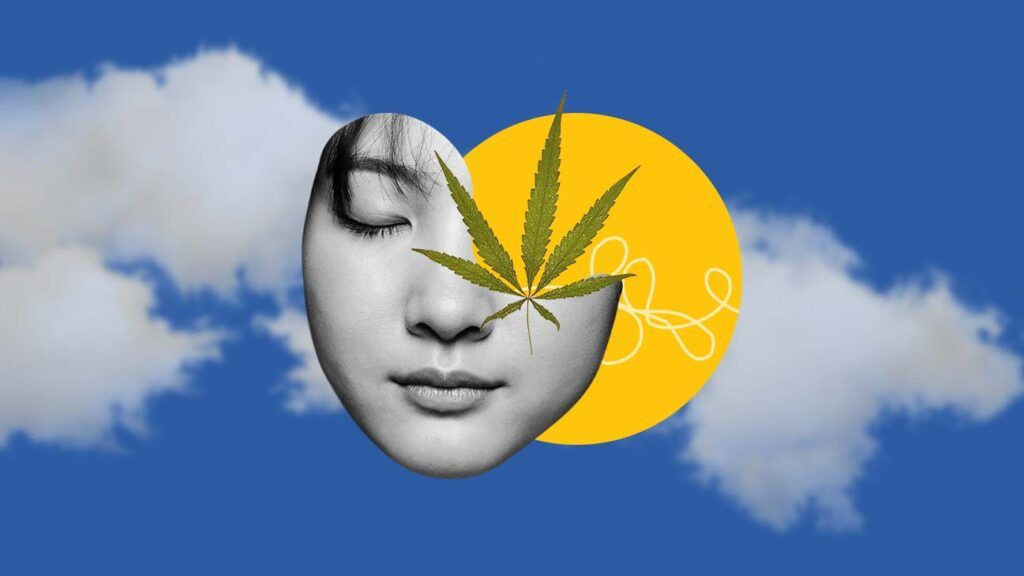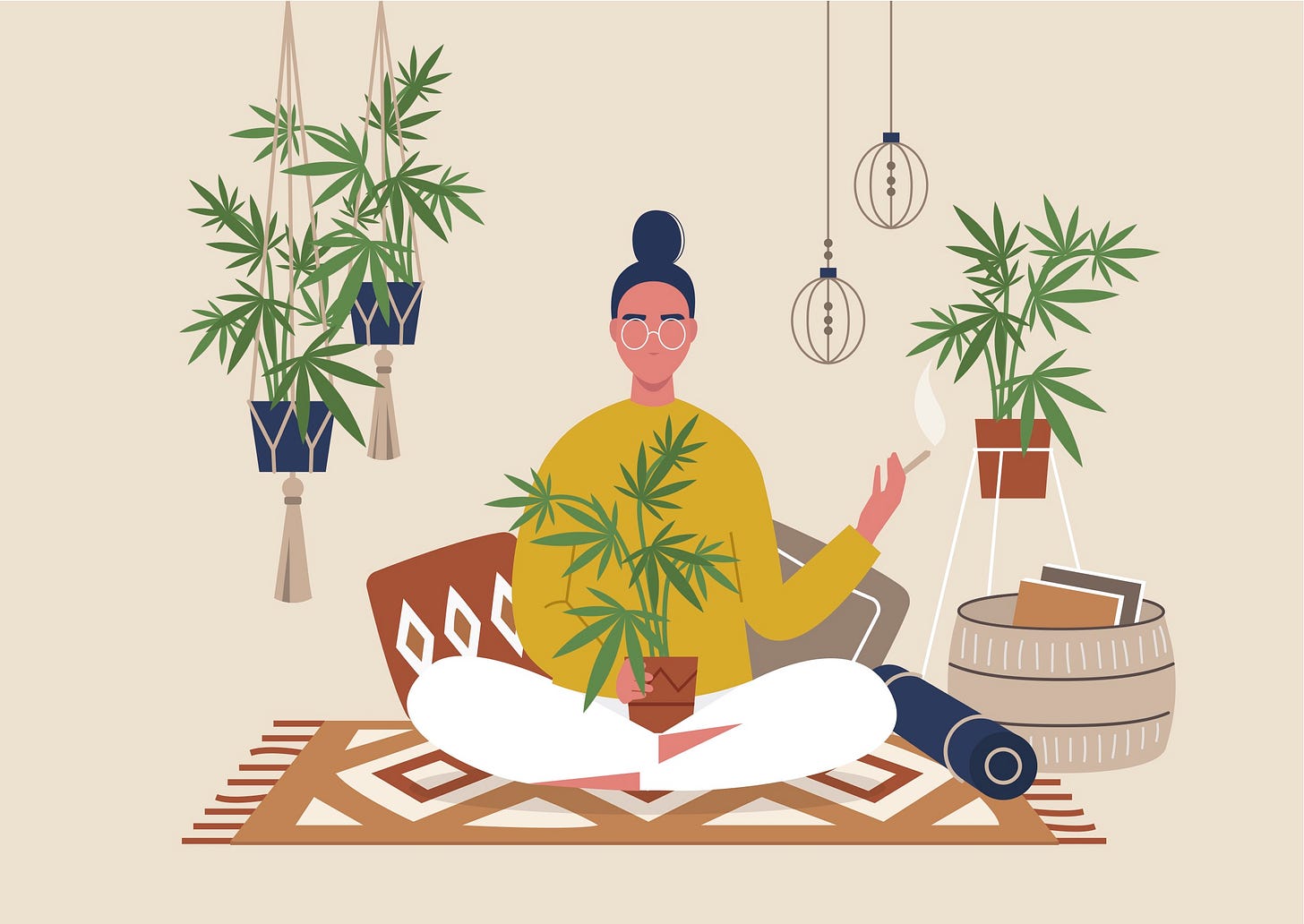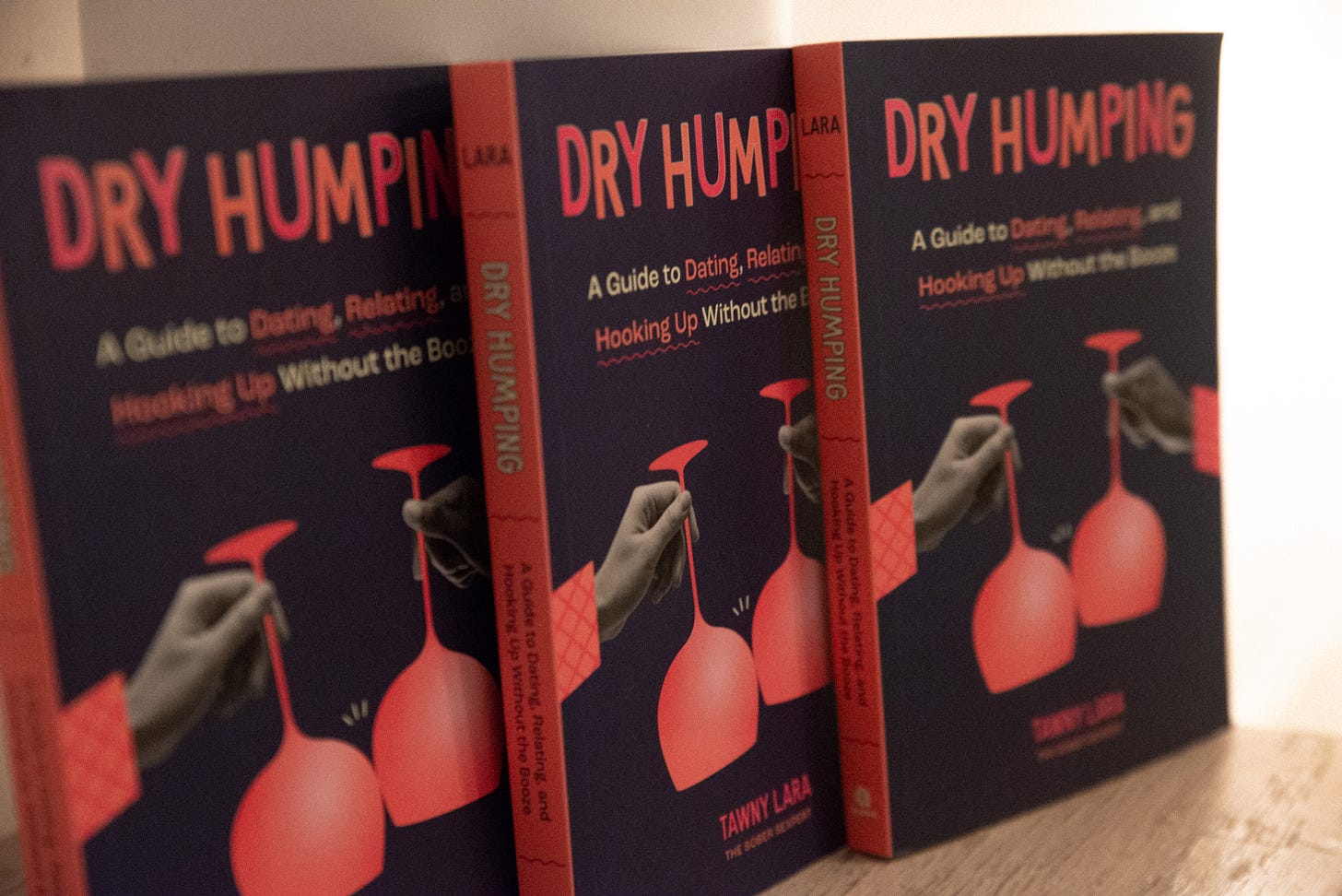Cannabis & Sobriety
A Cali Sober reader asks about friendships, cannabis, and how to define sobriety
Happy Hump Day! I’m Tawny, an advice columnist better known as “The Sober Sexpert” and author of Dry Humping: A Guide to Dating, Relating, and Hooking Up Without the Booze. I’m here to empower you to find your *intrinsic* courage without booze—regardless of your relationship status—one date at a time.
Dear Tawny,
I have a question about friendships, sobriety, and cannabis.
I’ve been in recovery from alcohol use disorder for over eight years, and I’ve never felt more secure about where I’m at. Recently, I decided to go off of my anxiety medication and have been experimenting with occasional gummies that are a 1:1 ratio of THC and CBD. I find that they help me relax and quiet my anxious mind without making me feel like I am depending on the gummies the way I depended on alcohol years ago. I guess this is what they call “Cali Sober.”
However, I was recently visiting a friend and staying with him when he mentioned that he takes THC gummies occasionally and would be having one that evening as we hung out after dinner. I obviously saw no problem with this but when I told him that I also occasionally take cannabis gummies, he was very confused and concerned.
This is one of my closest friends who was very much there during my darkest days of drinking, so he really saw the shit. And he’s been an incredible and vital part of my support system throughout the years, even if we don’t live in the same city anymore. I explained to him that this is part of my recovery journey and that I feel very secure in my sobriety, even if some would not consider me “fully” sober.
I think he understood, but it was still a tense and awkward conversation. What advice do you have for me going forward, both with this particular friend and in the future, when this may come up with others—especially those who knew me pre-recovery?
Thanks,
Cali Sober
Hey Cali. “Am I still sober if I use cannabis or psychedelics?” is a s question I get quite often during live events and podcast recordings where I’m the guest. I’ve also had several of these conversations with friends and loved ones since implementing cannabis into my own recovery two years ago. Listen to this episode of Recovery Rocks, the podcast I co-host with Lisa Smith, where I share it all. If you have no idea what California sober means, watch my quick video explainer. (P.S. Here’s a brief explainer on the difference between CBD and THC, and why combining them seems to have a better impact for those using cannabis for anxiety relief.)
It sounds like you have a loving, supportive friend who cares about your recovery, which is truly incredible because peer support is an essential part of our recovery stories. It’s common for your friend to be concerned because, well, your friends care about you! My now-husband had apprehensions about my bringing cannabis into our home a few years ago because we’re both in recovery from substance use disorder.
When I began, I told him (and a few other important people in my life) about my decision to implement cannabis into my recovery. I told him why (anxiety management), how (gummies and tinctures), and what support I had (a legit cannabis doctor, a cannabis-informed therapist, and a stack of medicinal cannabis books). Most people don’t need this much info. Remember, you’re never required to discuss your health or medications with anyone other than your doctors.
The awkward moments you had with your friend will happen; I still deal with them. Now is a great time to assess who you want to share this new phase of your recovery with. It’s also a great time to ponder how you want these future interactions to go.
Do you want to keep it low-key and say a simple, “I use cannabis now,” or use their questions as a chance to advocate for the destigmatization of using plant medicine in recovery? Or maybe somewhere in the middle?
NOTE: Before we proceed, I want to acknowledge that this is not a “how to replace alcohol with cannabis” piece. While cannabis might be a “better” or “safer” option than alcohol, it still has side effects. It’s still a psychoactive substance that can be abused/misused.
I also want to acknowledge that cannabis has changed drastically over time. To paraphrase my friend
, the weed that people smoke today isn’t the same stuff people smoked at Woodstock. Essentially, legal weed is stronger than ever before thanks to growing more potent strains and advancements in consumption technology. Take precautions and speak with your medical provider as you would when implementing any new substance, supplement, or medication.“It’s clear what excessive drinking can do to our bodies and minds. It’s too soon to say what effect commercialized cannabis—and its pervasive use—will have on our health.” Salomeh Keyhani, MD, writes in their Washington Post article, Ask a Doctor: Is marijuana as bad for me as alcohol?
Now back to me answering your actual question. Here’s what you’ll find if you keep reading:
Expert information on cannabis and recovery from:
Dr. Junella Chin, professor of Cannabis Health & Science at NYU and Syracuse, Vice Chairperson for the Cannabis Advisory Board for the New York State Office of Cannabis Management.
Peter Grayson, LCDP, Director of Addiction and Recovery at Nushuma, a Psychedelic Wellness Clinic in Manhattan
Sophie St. Thomas, a Cali sober author of multiple books, including Weed Witch: The Essential Guide to Cannabis for Magic and Wellness and Finding Your Higher Self: Your Guide to Cannabis for Self-Care
California sober resources like peer support groups, IG accounts, and trustworthy cannabis/psychedelic-informed MDs
Questions to ask yourself to make sure you’re not self-medicating with cannabis the same way you self-medicated with alcohol
Scripts for precisely what to say if you decide to “come out” to friends and family as Cali Sober
Talking points to use with others when they ask you about using cannabis as a sober (curious) person
What to Say When Someone Asks About Your Cannabis Use
Store these lines in your back pocket next time someone asks you about using cannabis in sobriety.
Them: You smoke weed now?!?! I thought you were sober.
You: I found a healthy way to implement cannabis into my recovery. Can I borrow your lighter?
Them: Oh wow! You’re eating a THC gummy?!?! I didn’t know sober people could do that!
You: Sobriety is deeply personal for everyone. While some define their sobriety by abstaining from all substances, being California sober works best for me today.
What to Say to Help Educate, Inform, and Destigmatize
Them: You smoke weed now?!?! I thought you were sober.
You: Alcohol and cannabis are different substances, but I can understand why most people lump them together. Learning about the differences between the two substances really helps my recovery journey.
Them: Oh wow! You’re eating a THC gummy?!?! I didn’t know sober people could do that!
You: Cannabis gets a bad reputation from the “lazy stoner” stereotypes and the historical racial injustices that led to the plant’s prohibition in the first place. To me, cannabis is just a plant that helps me take life one day at a time. I’m happy to email you some resources if you’re interested!
Additional Resources for Cannabis-Friendly Sobriety
Explore these resources on your own or share them with someone you love
Drug Use For Grown-Ups by Dr. Carl L. Hart
This episode of Amanda Kuda’s podcast about psychedelics & cannabis in sobriety
This piece by
about using THC in sobrietyAlcohol vs. Marijuana (American Addiction Center)
GRASS - cannabis-inclusive virtual peer support recovery groups
#cannamoms - check out this hashtag to see moms who have embraced cannabis
What I Told the VIPs in My Life
“My chronic anxiety became unbearable. I don’t want to increase my Lexapro dosage, and I don’t want to use benzos like Xanax. So, I’m working with a cannabis doctor to mindfully implement cannabis into my recovery.”
I was met with love and support and even a few “Cannabis doctors are a thing?!?!” I found that sharing my experience helped legitimize and destigmatize the medicinal cannabis conversation. (Y’all know I’m all about raising awareness and smashing stigma!)
What the Experts Say About Cannabis in Recovery
Dr. Junella Chin, professor of Cannabis Health & Science at NYU and Syracuse, Vice Chairperson for the Cannabis Advisory Board for the New York State Office of Cannabis Management. (P.S. She’s my “weed doctor!”)
How CBD can help folks in recovery from substance use disorder:
“In one promising development, CBD seems to help modify neuronal circuits that have been disrupted by long-term substance-abuse disorders. CBD may help to repair and rewire the brain’s reward structures in ways that make people less likely to act upon the triggers that previously sparked addictive behavior.”
How legalizing cannabis might help the opioid crisis:
“One study showed an interesting correlation between medical marijuana laws and opioid use. It concluded that Medicaid patients in states with marijuana laws used fewer opioid and non-opioid pain medications than states without legal medical marijuana laws. Hydrocodone use decreased 17.4% and morphine use decreased 20.7%. Less use translated to lower costs—a 10% decrease on average. In addition, doctors in medical marijuana states prescribed 1,800 fewer painkiller prescriptions for patients a year. Marijuana alone is not enough to completely solve this epidemic, but we need a treatment that can replace the opioids, improve their safety, and increase compliance to addiction treatment programs.”
Peter Grayson, LCDP, Director of Addiction and Recovery at Nushuma, a Psychedelic Wellness Clinic in Manhattan
On redefining ‘sobriety’ with nuance:
“One definition of sobriety could be maintaining your intentions, which are not necessarily black-and-white.”
On psychedelics vs cannabis use in recovery:
“Microdosing cannabis [daily] goes more into the symptom mitigation versus the almost surgical procedure [with psychedelics] trying to reach the root cause. For the right person, I'm a big fan and advocate of medical cannabis.”
Sophie St. Thomas, a Cali sober author of multiple books, including Weed Witch: The Essential Guide to Cannabis for Magic and Wellness and Finding Your Higher Self: Your Guide to Cannabis for Self-Care, kindly weighs in on this week’s question!
“My advice would be to suggest that the reader’s friend research the risk profile for anxiety medications, such as benzos, and compare it to that of cannabis. If their friend doesn't have an anxiety disorder, it might be hard for them to understand the need to stay medicated.
Let them see how you act after eating your edible and contrast that to their memories of your drunk bottom. There will be AA ‘big book thumpers’ who don't take you as seriously because you use cannabis. This is pretty regressive, but the hard truth is that you need to put yourself first and work on not giving a shit what others think. Do whatever is keeping you happiest and healthiest.”
This is already a long issue with tons of info, so I'll leave you with a few more wise words from Sophie to wrap up Cali Sober’s question. “Old-school recovery models have pretty wacky moral codes in terms of what they deem an acceptable medicine,” she said. “If you try to please everyone, you'll only let yourself down. Your real friends will see through your actions that you're in a healthier place. At the end of the day, though, it sounds like your friend cares about you, and just got worried, and considering he's obviously fine with cannabis, he'll come around.”
What advice would you give to this week’s reader? Do you have any personal experience with Cannabis in your recovery? If you don’t support cannabis in recovery, that’s totally valid. I ask that your comments remain respectful and curious rather than judgmental.
Next week’s issue is all about dating someone who drinks and how to identify signs of codependency. Thank you for being a paid subscriber. If a friend forwarded you this newsletter, subscribe here so you don’t miss out!
Happy Humping,
P.S. This issue was edited by









